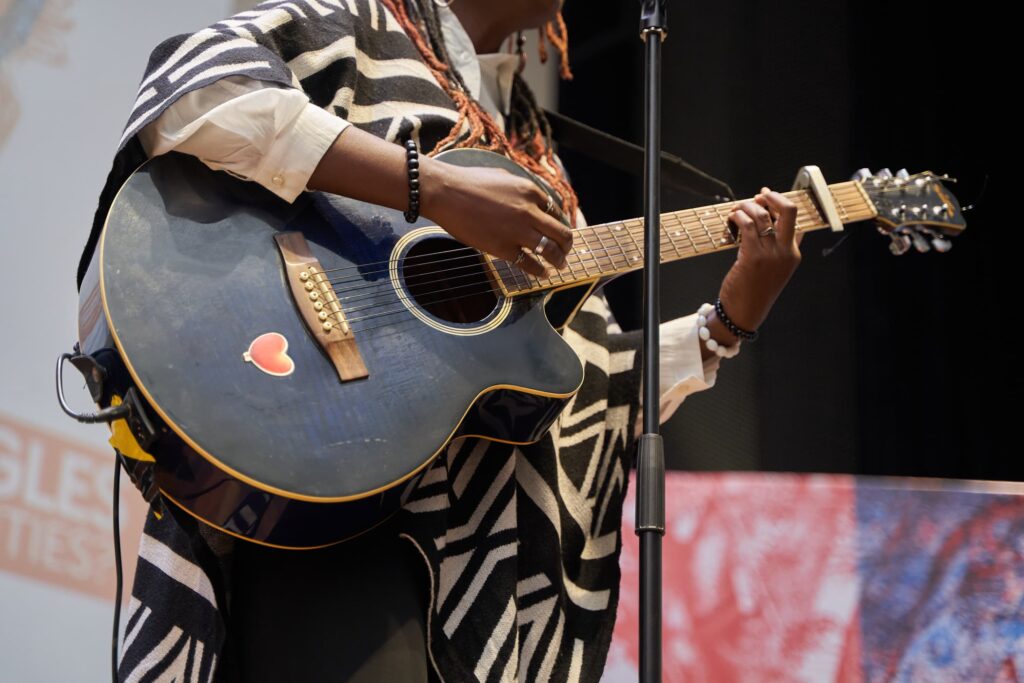Time and again, we see the power of music and poetry through self-expression, emotional release and healing. Beyond cultural divides, language barriers, and personal differences, these two art forms transcend these and reach the soul directly. Marrying words, sound and rhythm together, music and poetry continually create shared spaces for the artist and the listener. With this, both parties are welcome to dive into meaning, solace, and inspiration. What is the transformative force behind these two? Dive into this article where we discuss the power of music and poetry. We also cover some poets in Nigeria and music artist who heal and inspire through this art form.
Emotional Release and Healing
Music and poetry are cathartic. They serve as effective way for people to release deep-seated emotions, too difficult to express. There is this wave of relief when we listen to or read stories that resonates with us. Beyond melodies, beyond words and the stories we hear, we hear our own thoughts and feelings reflected back at us. Readers could catch a similar feeling from an expressive article by Ozioma Okafor, where she pointed that the road to healing is not linear. By peaking into her journey, we are inspired and see that we are not alone in ours.
Through music and poetry, stories capture the raw essence of human emotions. Poets and musicians have this skill of taking the most complex feelings and nicely processing them into a few profound lines. This often cuts through the heart. Through melody, harmony and rhythm, music adds new layers of emotion. This often intensifies joy, sadness, anger or longing in a way that words alone often can’t achieve. The power of music and poetry is seen when paired together as they serve as an outlet for emotions, helping people process their internal worlds and feel understood.
For example, consider a song that combines poetic lyrics with an emotive melody. The right combination of words and music can evoke memories, stir up feelings, and even bring a sense of peace or closure. Artists like Bob Dylan, Joni Mitchell, and Leonard Cohen have mastered this art, using music and poetry to tell stories that touch on universal human experiences. Ruth Mahogany’s Hope and Maybe discusses the despair that fills our souls when we think about the uncertainties in the world. For many, these songs offer not just entertainment, but emotional healing.
A Universal Language
One of the reasons music and poetry are so powerful is their ability to communicate across boundaries. Music, in particular, is often referred to as the “universal language.” Even without understanding the lyrics of a song, the emotional tone conveyed through its melody can speak volumes. Similarly, poetry, when read aloud, carries a rhythm and cadence that can evoke a feeling or mood, even if the listener doesn’t grasp every word.
This universality is one of the reasons why music and poetry have been used in rituals, ceremonies, and gatherings throughout history. From religious hymns to protest songs, from epic poems to intimate sonnets, these art forms connect people in ways that transcend individual experience. Whether it’s a love song that speaks to the depth of human connection or a protest poem that rallies people to action, music and poetry have the power to unite us in a shared emotional experience.
Inspiration and Transformation
Beyond emotional release and connection, music and poetry can also inspire personal growth and transformation. They often encourage introspection, pushing people to reflect on their own lives and consider new perspectives. Whether it’s through a song that prompts you to rethink a relationship or a poem that challenges your views on social issues, these art forms have the ability to shift mindsets and open hearts.
The process of creating art is a gift to the artist. The artist experiences a kind of transformation that can only be experienced through creation. This gives way to voicing personal experiences, turning pain, joy, and everything in between into something meaningful. This process of creation can bring clarity and healing to the artist. In turn, the finished product brings healing to the audience.
Unfiltered Emotions
For instance, spoken word poetry, which has become a popular medium for artists to express raw, unfiltered emotions. The combination of rhythmic speech and personal storytelling creates a powerful impact, as artists share their vulnerabilities, insecurities, and triumphs in front of an audience. For the performer, it’s a way to reclaim their narrative. For the audience, it’s an invitation to reflect on their own experiences and find empowerment in shared stories.
Likewise, music has been shown to help people heal from trauma, providing a safe space for emotional expression. From music therapy sessions to songwriting workshops, many individuals find that music helps them process their emotions in a nonverbal way. This is particularly effective for those who may find it difficult to articulate their feelings in words. The melodies, harmonies, and rhythms act as emotional conduits, helping people move through pain and find a sense of peace.
A conversation with Odenose about her song Time revealed that the song has grown to hold multiple meanings to her. Time reminds us that we do not control time, what we can do is control what we do within it. Odenose was inspired by how we often do not show up as the persons we will love to be in relationships, often because we don’t yet have the right tools or have not grown to communicate better. For this reason, time is what we really need to be better people for others, but many times we do not have the luxury of time and have to let go. This song is healing balm not only to its creator, but also to those who resonate deeply with it.
Crafting Messages That Heal and Inspire
The marriage of music and poetry offers endless potential for healing and inspiration. In Nigeria, poets like Dike Chukwumerije and Titilope Sonuga are notable figures whose words point to healing and inspiration. Dike Chukwumerije’s performances offering a voice of hope during challenging times, further exploring themes of national identity, resilience, and unity. His work connects deeply with audiences, providing emotional solace and a sense of belonging. Similarly, Titilope Sonuga, with her graceful use of language, delves into the complexities of womanhood, self-acceptance, and inner strength. Her poetry speaks directly to the soul, offering messages of healing, empowerment, and self-discovery.
Among poets in Nigeria whose words uplift and inspire, Ruth Mahogany blends her unique voice with poetry and music. Her work explores themes around vulnerability, resilience, and self-growth, creating deeply emotional experiences, and encouraging introspection and healing. By offering a fresh perspective on dealing with our insecurities and finding strength within ourselves, we can embrace their imperfections. This in turn fosters authentic growth, giving ourselves grace and extending it to others.
These poets. artists and writers, with their carefully crafted words, show how expressive art can reflect societal issues.

